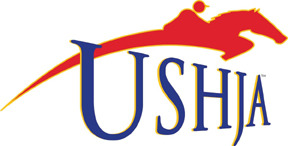The Aiding & Abetting Amateur: Goodbye, zombie hunters?
You know, the ones that lope around the show ring with a dead look in their eye and a lifeless step that says, “They lunged me for an hour before this class.” Earlier this week, the USHJA took a stand.From our columnist, the Aiding & Abetting Amateur:
If you have been trolling USHJA news recently, you will have noticed that the USHJA officials committee issued an interesting statement earlier this week. The statement was made regarding behavior in the hunter ring. The statement follows:
“The USHJA Officials Committee is a strong advocate of allowing a horse to show expression, not to the point of it being a safety issue or significantly disrupting the round, but natural and enthusiastic about the job at hand.”
Shelby French, CEO of USHJA and R Hunter Judge applauds the Officials Committee for their stance on this topic. “This statement issued by the Officials Committee provides the guiding philosophy on how we should be evaluating horses in the show ring.”

Now, if you’re like me, your initial reaction to this statement was pretty positive. If you’re a regular at the horse shows, it doesn’t take long to figure out that competitors in the hunter ring go to great lengths to ensure that they will have quiet rounds. Maybe this means an hour long lunging session on cool, foggy mornings at 5 a.m. (all non-horse people insert, “horse show people are insane” comment), maybe this means a long hack in the morning, and maybe this even means the use of drugs containing GABA (gamma aminobutyric acid). This amino acid has seen increasing popularity, particularly in the hunter ring. GABA is essentially the body’s first line of defense against stress. When an animal experiences over-stimulation, this inhibitory neurotransmitter is dumped into the system in an effort to calm the animal down and to prevent panic.
Carolina Gold and other drugs have taken GABA, the bodies natural defense against stress, and attempted to use it to give the animal a competitive edge in the hunter ring. These drugs are thought to diffuse stress, resulting in a down-played flight response to stimuli, lower head carriage, etc. These drugs seem to only have moderate success.
The USHJA released this statement partially in response to the recent controversies concerning Carolina Gold and other similar drugs.
CEO Shelby French informed the Aiding and Abetting Amateur that:
The statement of our Officials Committee was made because of the direction our sport has taken over the past few decades and their recognition that this needs to be adjusted so that the welfare of the horse is a priority.
Also, while their statement is not in response to the joint efforts of the racing industry and the sport horse world to bring the thoroughbred back into the hunter and jumper show ring, it is certainly in concert with those efforts, as the thoroughbred tends to be more expressive by nature.
It is certainly refreshing to see this kind of statement being released for the sake of the welfare of our animals. However, one must ask, “Are judges really ready to welcome this statement?” and “How much expression is too much expression?”
Shelby French responds:
Judging is subjective and each judge has their individual perspective, so quantifying what level of expression and enthusiasm is acceptable is just not possible. Certainly enthusiasm that is disruptive or unsafe is going to be penalized but the intention is to allow the horse to display natural expressiveness in its performance. The Committee has been emphasizing this perspective during the Judge’s Clinics this year and it has been well received.
Julie Winkle, USHJA Board of Directors Member, responds to the Aiding and Abetting Amateur by saying:
The majority of the judges already embrace this line of thinking, and I believe it’s largely a misconception among exhibitors and trainers that judges want to see lifeless robots in the hunter ring.
So we are hoping to clear this up by making the statement. Obviously we aren’t looking for crazy, dangerous runaways, but embrace alert, natural enthusiasm .
The bottom line is we are encouraging everyone (owners, riders, trainers, mothers) to become better horseman for the sake of our sport and our horses!!
I think this is all good news for the competitor and for the animal. If expression is truly going to be welcomed, and perhaps as Winkle suggests, already is welcomed, then we no longer have to go to the lengths (perhaps unethical lengths) to ensure dead-quiet rounds. Essentially, if judges do not select for unethical behavior (meaning lifeless robots do not win blue ribbons) then drugs like Carolina Gold and other inhibitory neurotransmitters will become obsolete.
Feedback welcomed! This is definitely an interesting topic.
Read more at The Aiding & Abetting Amateur blog:







Leave a Comment